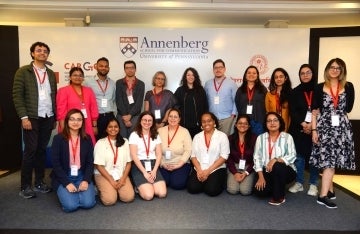Annenberg Students Win 2017 Ackoff Fellowships
Joshua Becker and Elissa Kranzler will conduct research in decision making under risk and uncertainty.

Photo Credit: University of Pennsylvania
Annenberg doctoral students Joshua Becker and Elissa Kranzler have received the Russell Ackoff Doctoral Student Fellowship Award for 2017 from the Wharton Risk Management and Decision Processes Center. This is the third year in a row, and the ninth year overall, that Annenberg students have been fellowship recipients.
The research fellowship, now in its twelfth year, is named in honor of Russell Ackoff, Professor Emeritus of Management Science, whose work was dedicated to furthering the understanding of human behavior in organizations. Made possible by an endowment from the Anheuser-Busch Charitable Trust, the fellowships are awarded to University of Pennsylvania doctoral students who are pursuing research in decision making under risk and uncertainty.
The Annenberg students’ projects are:
Joshua Becker — "Can Social Influence Improve Financial Forecasting?"
Abstract: Average estimates by large groups can be incredibly accurate, even when individuals within the group are very inaccurate. Statistical explanations for this “wisdom of crowds” phenomenon argue that group accuracy requires individuals to be either statistically independent, with uncorrelated error, or diverse, with negatively correlated error. Previous experimental results have suggested that when individuals can observe the beliefs of others, social influence reduces both independence and diversity without increasing accuracy. However, using formal models of social learning, I identify conditions under which social influence can improve the wisdom of crowds. When subjects are embedded in decentralized networks, these models predict that social influence can amplify the beliefs of accurate individuals, reducing error within the population as a whole. This research will use a web-based experiment to test these predictions with financial forecasting tasks, to identify whether social influence can improve collective accuracy for estimates of such values as stock prices, exchange rates, and employment figures.
Elissa Kranzler — "Harnessing the Power of a ‘Neural Focus Group’ to Predict Population-Level Anti-Smoking Message Effects on Risky Decisions Among Adolescents"
Abstract: Despite the challenges inherent in forecasting population-level effectiveness of anti-smoking messages, previous research suggests that neuroimaging can be a powerful predictive tool. The proposed study will examine the relationship between neural response in a small sample of adolescents during exposure to anti-smoking messages and population-level measures of intention to share messages and perceived message effectiveness. Findings from this study, the first of its kind with adolescents, will contribute to knowledge about the cognitive processes underlying effective and shareworthy messages likely to affect decisions around risky behaviors at the population level, and support the development of more effective anti-smoking messages.
Recent previous winners include: Natalie Herbert, Stella Lee, Sijia Yang, and Lori Young in 2016; and Devon Brackbill, Jiaying Liu, Holli Seitz, and Jingwen Zhang in 2015.



